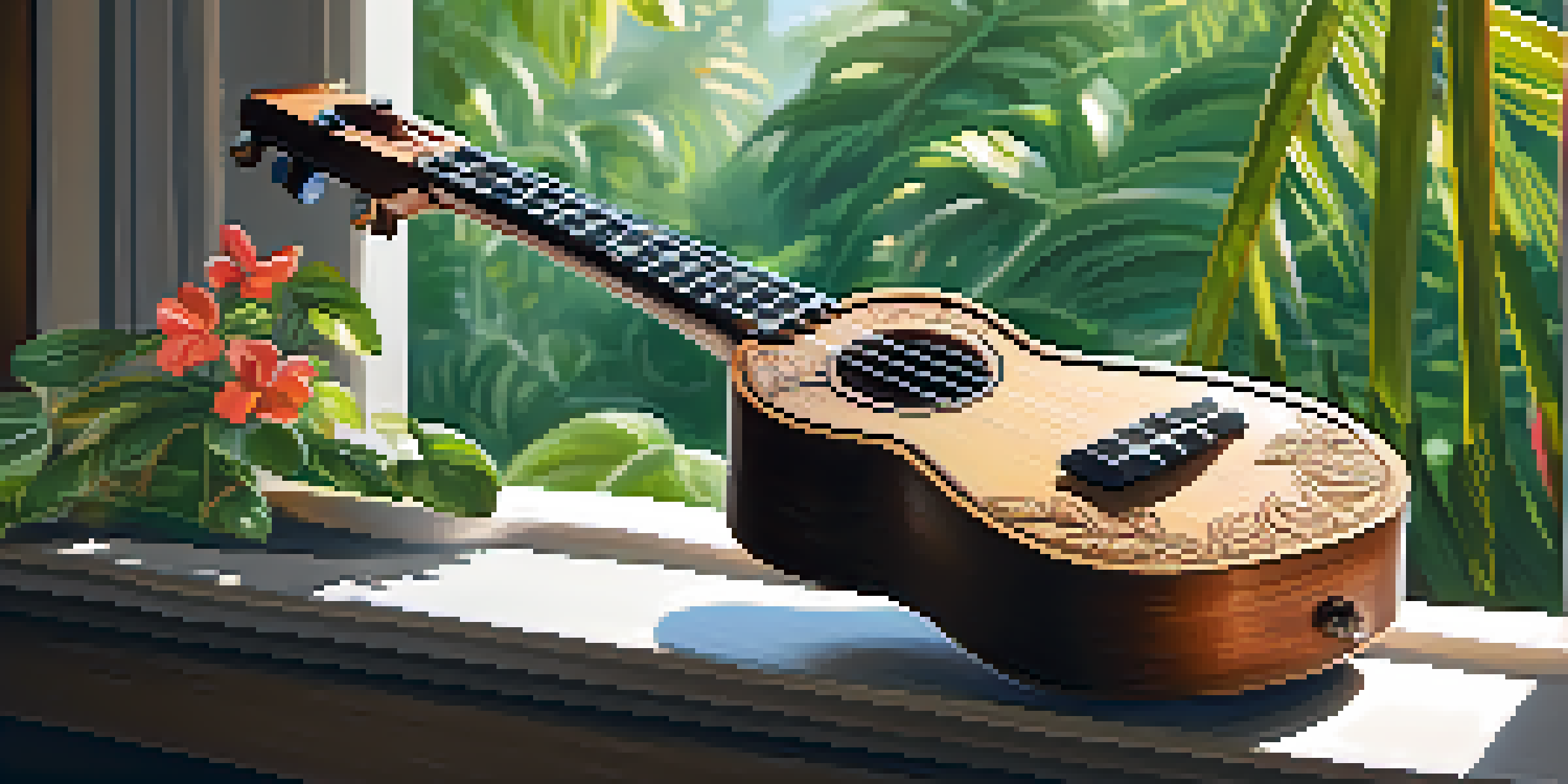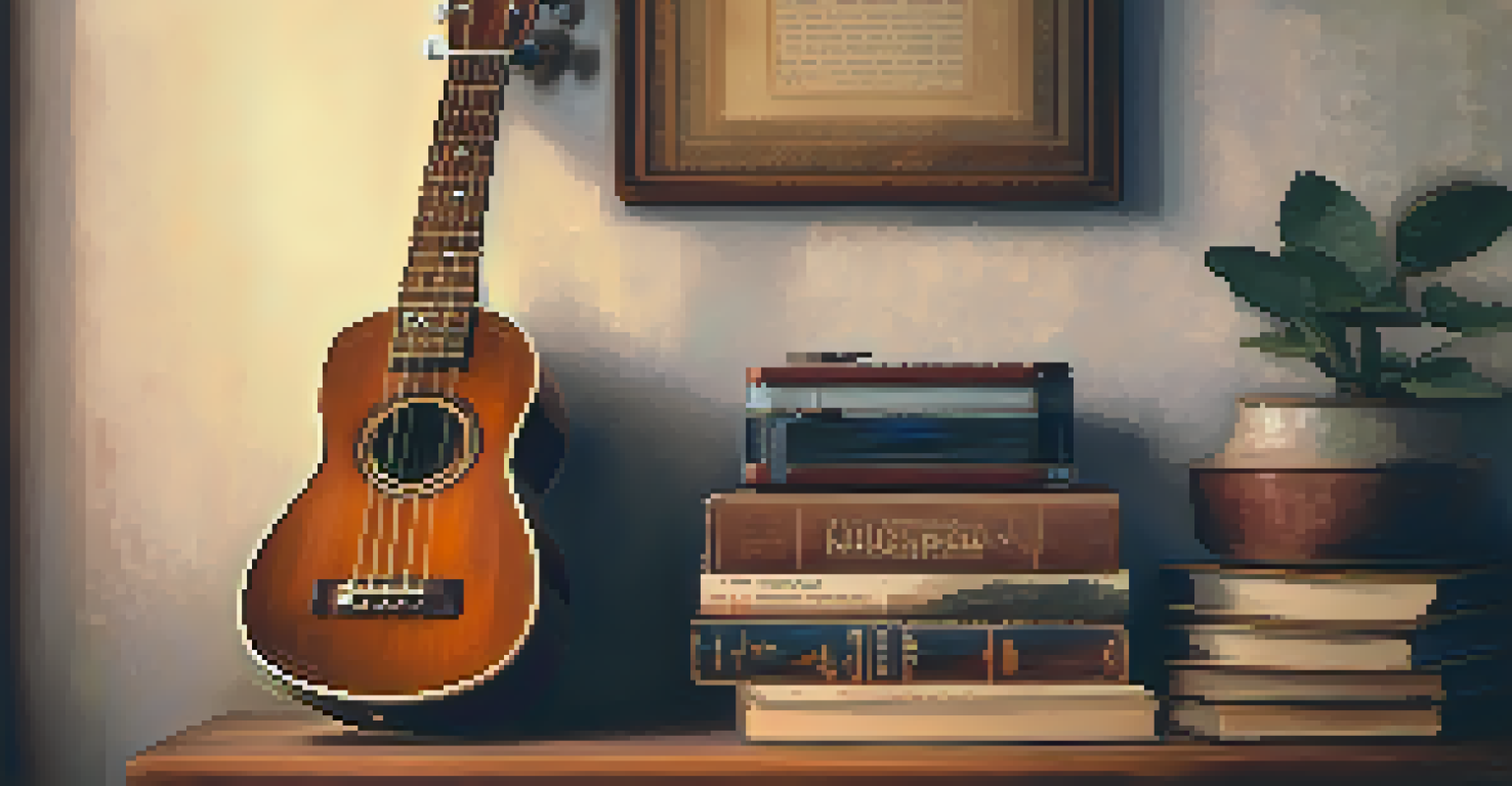Ukulele: The Hawaiian Instrument That Captivated the World

The Origins of the Ukulele: A Hawaiian Tradition
The ukulele has deep roots in Hawaiian culture, tracing back to the late 19th century. Originally derived from the Portuguese braguinha, this small string instrument quickly became a symbol of Hawaiian music and hospitality. The name 'ukulele' itself translates to 'jumping flea', which is said to describe the movement of the player’s fingers over the strings.
The ukulele is a joyful instrument. It's a beautiful way to connect with others and express yourself through music.
As the instrument gained popularity among Hawaiian musicians, it began to blend with local musical styles, creating a unique sound characterized by bright, cheerful melodies. Traditional Hawaiian songs often feature the ukulele, making it an essential part of cultural gatherings and celebrations. Its portability and ease of play also contributed to its widespread adoption, allowing it to be enjoyed by people of all ages.
Today, the ukulele stands as a proud emblem of Hawaiian heritage, representing the spirit of Aloha. It’s not just an instrument; it’s a way to connect with the rich stories and traditions of the islands. This connection to the past is what makes the ukulele so special, as it continues to bring joy to both players and listeners alike.
How the Ukulele Spread Beyond Hawaii
The ukulele's charm didn’t stop at the shores of Hawaii; it began to capture the hearts of people around the world in the early 20th century. Following its introduction to the mainland United States, the ukulele became a staple in vaudeville shows and jazz bands. This exposure helped to elevate its status and introduce its delightful sound to new audiences.

In the 1920s, the ukulele surged in popularity, fueled by the rise of recorded music and radio. Artists like Cliff Edwards, known as 'Ukulele Ike', showcased the instrument in hit songs, further embedding it in popular culture. Its playful sound resonated with listeners, making it a favorite for sing-alongs and casual performances.
Ukulele's Rich Hawaiian Heritage
The ukulele, originating from the Portuguese braguinha, has become a symbol of Hawaiian music and culture since the late 19th century.
By the mid-20th century, the ukulele became a symbol of carefree living and a go-to instrument for aspiring musicians. Its ability to evoke happiness and nostalgia helped it maintain a beloved place in music, transcending cultural boundaries. The journey of the ukulele from Hawaii to worldwide fame reflects its universal appeal and ability to bring people together through music.
The Ukulele's Role in Modern Music
In recent years, the ukulele has experienced a renaissance, finding its way into contemporary music genres. Artists across pop, rock, and indie scenes are embracing the instrument, using it to create fresh sounds that resonate with today's audiences. The ukulele’s distinctive tone offers a playful twist that complements a variety of musical styles.
In Hawaii, we have a saying: 'The ukulele is the instrument of the heart.'
From the catchy tunes of Jason Mraz to the heartfelt ballads of Ed Sheeran, the ukulele has proven to be a versatile companion for songwriters. Its lighthearted nature adds an element of fun, making it perfect for both upbeat tracks and soulful melodies. This adaptability has allowed it to flourish in the modern music landscape.
Moreover, the rise of social media platforms has paved the way for ukulele tutorials and performances to go viral. Musicians share their love for the instrument, inspiring new players to pick one up and join the community. This resurgence not only highlights the ukulele's relevance today but also fosters a sense of camaraderie among players around the globe.
Learning to Play the Ukulele: A Beginner's Guide
One of the most appealing aspects of the ukulele is its accessibility for beginners. With only four strings and a relatively small body, it's easier to learn than many other instruments. Whether you’re a child or an adult, the ukulele invites you to explore the joy of making music without feeling overwhelmed by complexity.
Starting on the ukulele typically involves learning a few basic chords, which can be picked up in no time. For instance, simple chords like C, G, and F can allow you to play countless songs. Online tutorials and mobile apps are abundant, making it easy to find resources that suit your learning style and pace.
Global Appeal and Popularity
From vaudeville to contemporary music, the ukulele has captivated audiences worldwide, reflecting its universal charm and ability to bring people together.
As you progress, you’ll discover the joy of strumming along to your favorite tunes and even composing your own songs. The sense of achievement that comes from playing music is incredibly rewarding, and the ukulele offers that experience in a fun and engaging way. Plus, there's a vibrant community of ukulele enthusiasts to connect with, making the journey even more enjoyable.
The Ukulele Community: A Global Family
The ukulele has fostered a vibrant global community that transcends geographic boundaries. Players of all ages and backgrounds come together to celebrate their shared passion for this charming instrument. From local clubs to international festivals, the sense of camaraderie among ukulele enthusiasts is palpable.
Social media platforms have played a significant role in connecting players worldwide. Musicians share their performances, tips, and tutorials, creating a supportive environment for both beginners and seasoned players. Hashtags like #ukulele and #ukulelecommunity allow individuals to discover new friends, collaborate on projects, and inspire each other.
In addition to online connections, ukulele festivals and meetups provide opportunities for face-to-face interactions. These events often feature workshops, jam sessions, and performances, allowing participants to learn from one another and celebrate their love for music together. The ukulele community truly embodies the spirit of togetherness, making it a welcoming space for all.
Caring for Your Ukulele: Tips for Longevity
To keep your ukulele sounding its best, proper care and maintenance are essential. Regularly checking the tuning and changing the strings will help maintain its sweet, bright tone. It's a simple task that can significantly enhance your playing experience and ensure your instrument remains in good shape.
Temperature and humidity can also affect your ukulele's condition, so finding a suitable storage environment is crucial. Avoid exposing it to extreme heat or cold, and consider using a case or bag for protection when not in use. These small steps can prevent warping and damage, allowing your ukulele to last for years.
Accessible for Beginners
With its four strings and simple chords, the ukulele is an inviting instrument for beginners, making music accessible to all ages.
Lastly, don't forget to clean your ukulele regularly. Wiping down the strings and body after each session will help remove oils and dirt, preserving its appearance and sound. By treating your instrument with care, you can enjoy the delightful music it produces for many years to come.
The Future of the Ukulele: Innovations Ahead
As the ukulele continues to evolve, innovations in design and technology are emerging. Manufacturers are experimenting with different materials and shapes to enhance sound quality and playability. From electric ukuleles to unique wood combinations, these advancements are expanding the possibilities for musicians.
Additionally, the rise of online learning platforms has made it easier than ever for people to start playing the ukulele. Virtual lessons and interactive apps are providing engaging ways to learn, making the instrument more accessible to a wider audience. This tech-savvy approach is likely to attract a new generation of players.

Looking ahead, the ukulele is poised to maintain its popularity in the ever-changing music landscape. With its rich history, welcoming community, and innovative spirit, the ukulele will continue to inspire musicians and bring joy to people around the world. The future looks bright for this beloved Hawaiian instrument.